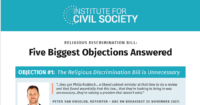This article was originally published at The Spectator Australia website and is re-posted here with permission.
The Parliament of Victoria is about to vote on a bill to legalise assisted suicide and euthanasia. Health Minister Jill Hennessy has claimed it has robust safeguards. But the bill is not as safe as it is made out to be.
In fact, there are massive holes in the so-called safeguards. If these are not addressed, they will facilitate assisted suicide and euthanasia for vulnerable people whose request is not truly voluntary. Those wanting assisted suicide might be manipulated or subject to undue influence. Or they might find their ability to make judgments in their own best interests affected by significant depression or mood disorders.
Is this really the kind of bill that MPs should vote for? Shouldn’t they be absolutely certain that potential abuse is protected against, that the vulnerable are safe, and that people are not mistakenly taking their own life? There are numerous problems with the bill as it currently stands. But I will outline three big ones.
First, the safeguards at the time of prescribing the lethal drugs are inadequate. For example, the bill sets out that a person who requests a prescription for lethal drugs must have decision-making capacity to understand the consequences of taking the drugs.
But decision-making capacity cannot, and does not, guarantee sound judgement is being exercised on the part of the person requesting the drugs. For one, while the bill does ensure that a person who is diagnosed with a mental illness or disability cannot request voluntary assisted suicide, what about checking for undiagnosed conditions? There is no requirement to check that the person’s judgement is not impaired in this way.
Second, the safeguards at the time of ingesting the lethal drugs are inadequate. It is perfectly conceivable that the individual’s circumstances will have changed since attaining the drugs.
They may have developed clinical depression or have other mental impairments at the time the poison is ingested, impairing their ability to make a sound choice. Their disease or condition may be in remission or be cured—they are not going to die within 12 months anymore. The bill doesn’t have any safeguards or checks in place for these or similar situations.
A third problem is that the bill doesn’t have enough safeguards ensuring voluntariness at the time of ingestion. This opens the door to elder abuse and forced suicide or euthanasia.
For example, someone may have requested the drugs and then at a later time they might change their minds and decide not to take them. But someone else, whether a family member, friend, or medical doctor, might convince or coerce them to take the drugs anyway.
An incident along these lines occurred recently in the Netherlands. A doctor drugged an elderly woman with dementia in a nursing home without her knowledge and then proceeded to give her a lethal injection. The woman woke up and fought against the administration of the drug and was held down by members of her family. The after-the-fact review board gave the doctor a slap on the wrist.
There are no checks and balances in the bill preventing this kind of abuse at the time of ingestion. The deceased person will obviously have no capacity to report elder abuse or coercion. And the person won’t be around for any later check that they had decision making capacity or exercised a free choice with unimpaired judgment.
These are three big problems with the bill as it currently stands. It has inadequate safeguards at the time of prescribing the lethal drugs. It has inadequate safeguards at the time of ingesting the lethal drugs. And it does not ensure that the lethal drugs are taken voluntarily.
MPs voting on this law need to be sure that the risks and uncertainties associated with legalising assisted suicide are adequately dealt with. Such an important and consequential law, like this one, ought to have all the safeguards necessary to protect life and prevent unnecessary death. Even those who agree with assisted suicide need to be certain that the vulnerable are protected.
If it doesn’t have these safeguards, it’s a bad law and shouldn’t pass through the Parliament. As it stands, the safeguards in the bill are weak. And because of this they don’t adequately protect the vulnerable. They don’t adequately protect against abuse. And they don’t adequately protect against mistaken suicide.
That doesn’t sound like a good law. Here’s hoping it doesn’t pass.
Simon Kennedy is a research analyst at the Institute for Civil Society.








Recent Comments